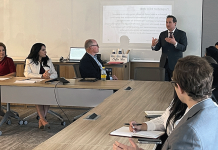 Despite their leaders’ vow to concentrate their attention on the pandemic and economic crises, it’s business as usual at the California Legislature.
Despite their leaders’ vow to concentrate their attention on the pandemic and economic crises, it’s business as usual at the California Legislature.
In early spring, the Legislature had good reason to give the full measure of its focus to the state’s worst modern health crisis and economic freefall. Legislators scrambled their schedule, going on hiatus for two months. Many at-risk legislators stayed away or severely limited their presence in the Capitol. Committee hearings were collapsed, relocated, and even held on the weekend.
At the outset of the crisis, Assembly Speaker Anthony Rendon remarked that lawmakers will hear this year only a fraction of the bills they normally consider, “prioritizing coronavirus as a policy area.”
One of the Legislature’s busiest members, Assemblywoman Lorena Gonzalez, agreed. “I think any legislator who’s not rethinking what will be reconsidered important this year just isn’t doing their job. This changes everything. We are looking at our bills and saying, ‘Is this necessary this year?’”
That was then. Today, as the Legislature grinds down the last two weeks of its unprecedented session, no issue of public policy does not meet this “necessity” standard. Far from focusing on quashing the pandemic or helping California workers and employers recover from these twin disasters, it’s back to business for the Legislature, rushing regulatory burdens that instead will hobble growth and deter bringing unemployed workers back onto the payroll.
Consider these baker’s dozen of bill and budget proposals still surviving the late stage of Legislative debate:
(Fun fact: more than half the proposals are authored or coauthored by the prolific Assemblywoman Gonzalez, who apparently self-exempted from the need to “rethink” or “reconsider” policies not focused on crisis recovery.)
Protected leave: SB 1383 requires businesses with as few as five employees to provide 12 weeks of protected leave each year, threatening litigation for any unintentional mistake.
Online marketplaces: AB 3262 would, in the words of a Democratic Senator, “(E)ffectively strangle the only pathway that small businesses currently can pursue to sell goods and earn revenues online, by extending strict liability to the online marketplaces where their goods are offered for sale.”
Garment manufacturing: SB 1399 targets non-unionized employers in the garment manufacturing industry by eliminating piece rate as a method of payment, even though it can benefit employees, and increasing litigation exposure for labor contractors for these workers.
Attorney fees: AB 1947 undermines administrative resolution of whistleblower cases by ordering attorney’s fees for retaliation claims, thereby incentivizing litigation over resolution. Governor Newsom vetoed similar legislation last year.
Wage disparities: SB 973 requires California employers to submit potentially incomplete or misleading pay data to state agencies that may allow advocates to characterize a false impression of wage disparity where none exists.
Prevailing wages: AB 2231 creates a statutory minimum amount of public subsidy that would trigger prevailing wage requirements on an otherwise private project, overturning established practice of considering the subsidy in the overall context of the project. Two Governors have vetoed this proposal.
Warehouse workers: AB 3056 limits the ability of warehouse employers to use performance standards, like boxes-per-hour, and adds a related litigation risk to employing warehouse workers.
Health system mergers: SB 977 presumptively characterizes health system mergers or acquisitions as anticompetitive and empowers the Attorney General to reject this market activity.
Recycling: SB 54 and AB 1080 were left for dead at the end of 2019. As resurrected, these measures require millions in new state government spending, expansive new rules and fee authority by state regulators, and fail to address deficiencies in existing programs like the Bottle Bill, while the state struggles financially.
Climate goals for farms: AB 2954 directs the Air Resources Board to develop a climate neutrality goal for agricultural and working lands, which could result in the consolidation of crop types and reduce diversity of food supplies in California.
Taxpayer confidentiality: SB 972 requires state tax collectors to disclose the identities and amounts of tax credits claimed by any taxpayers with gross receipts of more than $5 billion. This violates long-respected taxpayer confidentiality, undermines business strategy, and destabilizes the competitive market.
Trade secrets: SB 749 removes the protection of confidentiality of certain trade secrets by businesses that contract with state agencies.
Legislative leaders extended their promise of crisis management to the annual state budget. The Senate lead on budget issues, Holly Mitchell, earlier said she expects “a keep-the-lights-on kind of budget.” Nonetheless, with just two weeks left in its session, the budget committees held a special hearing to consider reorganization of state agencies regulating … consumer financial institutions.
The coronavirus and economic recession may consume the attention of California voters, businesses and residents, but leave it to the Legislature to find the time and fortitude to treat this year as it does any other.
Contact: Loren Kaye


